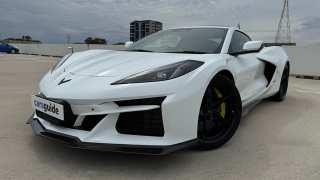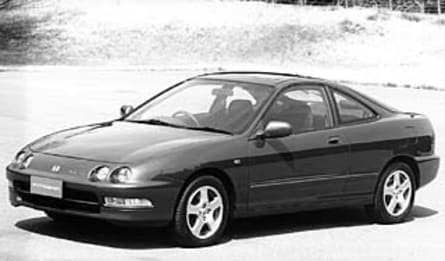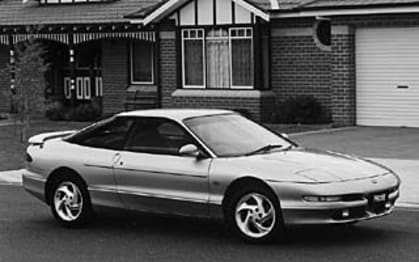
Used Honda Integra review: 1993-1997
- Honda Integra
- Honda Integra 1993
- Honda Integra 1994
- Honda Integra 1995
- Honda Integra 1996
- Honda Integra 1997
- Honda Integra Reviews
- Honda Reviews
- Honda Hatchback Range
- Honda Coupe Range
- Hatchback
- Coupe
- Honda
- Used Car Reviews
- Buying tips

The Honda Integra had the same soft image as most other Japanese sports coupes until the sleek model that came out in 1993 turned it into a credible power player. The transformation had a far-reaching effect on the industry and resulted in several competent coupes from other car companies. The transformation came mostly in the form of Honda's clever VTEC powerplant.
An all-purpose engine, it overcame the limitations of its low capacity with an innovative system that varied valve timing and intake tract length. The result was bags of torque at low speeds for smooth drivability, miserly fuel consumption, and a powerful punch for plenty of get-up-and-go at higher speeds.
Model watch
The new coupe was a stylish, front-wheel-drive, three-door hatch. It had a new body that was much stiffer than its predecessor, providing a stable foundation for the sort of sharp responsive handling the Integra would become renowned for.
There were two models:
The GSi was a combination of sporty styling and a flexible 1.8-litre four-cylinder engine, with the choice of a five-speed manual gearbox or four-speed auto transmission. It had multi-point electronic fuel injection and put out a respectable 107kW.
The hot VTi-R's VTEC motor was a revelation. The 1.8-litre engine had twin camshafts with four valves per cylinder and electronic multipoint fuel-injection. It cleverly varied the valve timing and intake manifold length for optimum performance right through the rev range.
The result was a peak power of 125kW at a heady 7300 revs and a top torque of 173Nm at 6200 revs. In practice, this meant low-end punch for smooth drivability and efficient running that was not compromised in the pursuit of top-end power.
The VTi-R was remarkably smooth and tractable around town, where it would roll along smoothly and unfussed, but when you opened the throttle and asked for it to perform it would, and how!
Before the Subaru WRX there wasn't much better than the Integra VTi-R on our roads. There was no doubt Honda intended the Integra, in its VTi-R guise at least, to be a full-on performance car.
The spirited engine was enough to convey that message to anyone who cared to use their right foot. It was complemented by sharp and responsive handling courtesy of the VTi-R's sports suspension, but it also came with a hard ride that made it difficult to live with day in day out.
Inside, the Integra was a little cramped, and its dark trim colours made it a little gloomy. But it was well equipped. The GSi featured an adjustable steering column, central locking, power windows and mirrors, power steering, a radio cassette sound system with four speakers, and a sunroof.
A driver's airbag was added in 1994 and ABS became standard in 1998. Extras included airconditioning, a CD player and a rear spoiler. In addition to the GSi features, the VTi-R had standard ABS brakes, a driver's airbag, alloy wheels and sports suspension.
In the shop
Hondas generally enjoy respect from mechanics who universally praise their quality and reliability, and the Integra is no exception. Before the arrival of the prestige Japanese brands such as Lexus, Honda was regarded as the best Japanese carmaker, and mechanics are happy to report they remain solid and reliable even with high mileage.
One mechanic even went so far as to say 300,000km was well within their reach without any real loss of integrity. But Honda has some of the most expensive spares in the business, so you need to be prepared for a big spend if something does go amiss. It is also worth asking for a service record.
Honda engines are not free-spinning and a cam timing belt failure, breakage or jumping can lead to expensive engine damage. Check that the belt has been changed at the recommended intervals.
Metallic paint can be difficult to match so look for mismatches that might indicate crash damage. Check plastic bumpers for chips and scratches that are expensive to fix. Inside, expect to find heavy wear on the side bolsters of the sports seats and wear on the carpet.
Otherwise the interior stands up well with quality plastic parts that do not distort. Belt up: Check for a verifiable service record that shows regular cam belt changes.
Metal guru: Metallic paint can be difficult to match so look for mismatches.
Chip packet: Check plastic bumpers for chips and scratches that can be expensive to fix.
High miler: The chassis holds up well even after a lot of kilometres.
Wear with all: Expect to find heavy wear on the side bolsters of the sports seats, and wear on the carpet underfoot.
Pricing
| Year | Price From | Price To |
|---|---|---|
| 1997 | $2,970 | $4,950 |
| 1996 | $2,970 | $4,950 |
| 1995 | $2,970 | $4,950 |
| 1994 | $2,970 | $4,950 |
| 1993 | $2,640 | $4,950 |
Pricing guides
Range and Specs
| Vehicle | Specs | Price* | |
|---|---|---|---|
| (LS) | 1.8L, ULP, 5 SP MAN | $2,640 – 4,070 | 1993 Honda Integra 1993 (LS) Pricing and Specs |
| GSi | 1.8L, ULP, 4 SP AUTO | $3,080 – 4,840 | 1993 Honda Integra 1993 GSi Pricing and Specs |
| VTi-R | 1.8L, PULP, 5 SP MAN | $3,190 – 4,950 | 1993 Honda Integra 1993 VTi-R Pricing and Specs |
Other cars to consider
$2,640
Lowest price, based on third party pricing data










